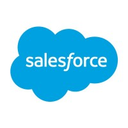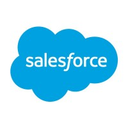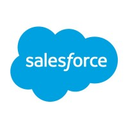Mailchimp vs Salesforce (2025 Comparison)

Mailchimp offers a user-friendly interface and affordable pricing, making it ideal for small businesses. Its strong email marketing features help you create effective campaigns that engage your audience.
- User-friendly interface for beginners.
- Affordable pricing for small businesses.
- Strong email marketing features.
- Limited CRM capabilities.
- Basic automation features.
Free plan?
YesStarting price
$13 per month
Salesforce provides comprehensive CRM capabilities and advanced automation tools, making it a top choice for businesses looking to enhance customer interactions and streamline processes.
- Comprehensive CRM capabilities.
- Advanced automation tools.
- Robust analytics and reporting.
- Steep learning curve.
- Higher pricing for small businesses.
Free plan?
NoStarting price
$25 per month per userWhat is Mailchimp?
Mailchimp is a comprehensive marketing platform that helps businesses of all sizes manage their email marketing campaigns. It offers a user-friendly interface, making it easy for users to create, send, and analyze email campaigns. With its automation features, Mailchimp allows you to set up targeted campaigns that reach the right audience at the right time. It also provides detailed analytics to help you understand your audience's behavior and improve your marketing strategies. Whether you're a small business owner or a marketing professional, Mailchimp can help you streamline your marketing efforts and achieve your business goals.
What is Salesforce?
Salesforce is a leading customer relationship management (CRM) platform that helps businesses manage their sales, marketing, and customer service operations. It offers a wide range of tools and features that enable businesses to streamline their processes, improve customer engagement, and drive sales growth. With Salesforce, you can track customer interactions, manage leads and opportunities, and automate your sales processes. Its robust analytics and reporting capabilities provide valuable insights into your business performance, helping you make informed decisions. Whether you're a small business or a large enterprise, Salesforce can help you enhance your customer relationships and achieve your business objectives.
Pros and Cons of Mailchimp vs Salesforce

Pros & Cons of Mailchimp
- Mailchimp's interface is designed with simplicity in mind, making it easy for users to navigate and manage their email campaigns without any technical expertise. This is particularly beneficial for small business owners and beginners.
- Mailchimp offers competitive pricing plans that cater to small businesses and startups. Its cost-effective solutions provide excellent value for money, allowing businesses to access essential marketing tools without breaking the bank.
- Mailchimp excels in email marketing, offering a wide range of features such as customizable templates, automation, and analytics. These features enable businesses to create effective email campaigns that engage their audience and drive results.
- While Mailchimp offers some basic CRM functionalities, it lacks the comprehensive CRM capabilities that larger businesses may require. This limitation may hinder businesses looking for a more robust CRM solution.
- Mailchimp's automation features are primarily focused on email marketing, which may not be sufficient for businesses looking to automate more complex processes. This limitation may require businesses to seek additional tools for advanced automation needs.

Pros & Cons of Salesforce
- Salesforce is renowned for its robust CRM capabilities, offering a wide range of tools to manage customer relationships, track sales, and analyze data. Its comprehensive features make it a top choice for businesses looking to enhance their customer interactions.
- Salesforce offers advanced automation tools that streamline complex business processes and improve efficiency. Its automation capabilities allow businesses to automate various tasks, freeing up time and resources for more strategic activities.
- Salesforce provides extensive analytics and reporting tools that offer valuable insights into business performance. Its robust analytics capabilities enable businesses to track various metrics and make data-driven decisions to drive growth.
- Salesforce's extensive features and customization options can be overwhelming for new users, resulting in a steep learning curve. Businesses may need to invest time and resources in training to fully leverage the platform's capabilities.
- Salesforce's premium pricing model may be a barrier for small businesses and startups with limited budgets. While its features justify the cost for larger enterprises, smaller businesses may find it challenging to afford the platform.
Mailchimp vs Salesforce: At A Glance
Value to Price
Mailchimp offers a competitive pricing structure that provides excellent value for small to medium-sized businesses. Its features are robust, yet affordable, making it a great choice for those on a budget. Salesforce, on the other hand, offers a more premium pricing model, but with a comprehensive suite of features that justify the cost for larger enterprises. If you're looking for a cost-effective solution with essential features, Mailchimp is ideal. However, if you need a more extensive toolset and can invest more, Salesforce is worth considering.
Ease of Use
Mailchimp is known for its intuitive interface, making it easy for users to navigate and manage their email campaigns without much hassle. It's perfect for beginners or those who prefer a straightforward tool. Salesforce, while powerful, has a steeper learning curve due to its extensive features and customization options. If you prioritize ease of use and want to get started quickly, Mailchimp is the way to go. However, if you're willing to invest time in learning a more complex system for greater functionality, Salesforce is a strong contender.
Functionality
Salesforce excels in functionality, offering a wide range of tools for sales, marketing, and customer service. Its CRM capabilities are unmatched, making it a top choice for businesses looking for a comprehensive solution. Mailchimp, while primarily focused on email marketing, offers solid functionality for its intended purpose. If you need a tool with extensive CRM features and advanced functionality, Salesforce is the better option. However, if your primary focus is on email marketing, Mailchimp provides all the necessary tools to succeed.
Scalability
Salesforce is designed to scale with your business, offering solutions that grow as your needs evolve. Its robust infrastructure supports large enterprises with complex requirements. Mailchimp, while scalable, is more suited for small to medium-sized businesses. If you're planning for significant growth and need a platform that can handle increased demands, Salesforce is the better choice. However, if you're a smaller business with moderate growth expectations, Mailchimp offers sufficient scalability.
Integrations
Both Mailchimp and Salesforce offer a wide range of integrations, allowing you to connect with other tools and platforms seamlessly. Mailchimp's integrations are user-friendly and cater to various marketing needs. Salesforce, with its extensive ecosystem, provides integrations that support complex business processes. If you need straightforward integrations for marketing purposes, Mailchimp is a great choice. However, if you require more advanced integrations for comprehensive business operations, Salesforce is the superior option.
Customer Support
Salesforce is renowned for its excellent customer support, offering various channels for assistance, including phone, email, and live chat. Mailchimp also provides solid support, but with more limited options compared to Salesforce. If you value comprehensive customer support and need assistance with complex issues, Salesforce is the better choice. However, if your support needs are more basic, Mailchimp's support options should suffice.
Security
Both Mailchimp and Salesforce prioritize security, implementing robust measures to protect user data. Salesforce, with its enterprise-level security features, is ideal for businesses with stringent security requirements. Mailchimp also offers strong security, suitable for small to medium-sized businesses. If security is a top priority and you require advanced features, Salesforce is the better option. However, for standard security needs, Mailchimp provides adequate protection.
Overall Rating
Overall, Salesforce scores higher due to its comprehensive features and scalability, making it ideal for larger enterprises. Mailchimp, with its user-friendly interface and affordability, is perfect for small to medium-sized businesses. If you're looking for a powerful CRM with extensive capabilities, Salesforce is the top choice. However, if you need a straightforward email marketing tool, Mailchimp is the way to go.
Mailchimp vs Salesforce: A Detailed Breakdown of Key Features
Email Campaigns
Mailchimp excels in email campaigns, offering a user-friendly interface and a variety of templates to create engaging emails. Its drag-and-drop editor makes it easy to design professional-looking emails without any coding skills. Salesforce, while offering email campaign capabilities, is more focused on CRM functionalities. If your primary need is to run effective email campaigns, Mailchimp is the better choice. However, if you need a tool that integrates email campaigns with CRM features, Salesforce is worth considering.
CRM Capabilities
Salesforce is a leader in CRM capabilities, providing a comprehensive suite of tools to manage customer relationships, track sales, and analyze data. Its robust CRM features make it ideal for businesses looking to enhance their customer interactions. Mailchimp, while offering basic CRM functionalities, is primarily focused on email marketing. If you need a powerful CRM solution, Salesforce is the top choice. However, if your focus is on email marketing with some CRM features, Mailchimp is a viable option.
Automation
Both Mailchimp and Salesforce offer automation features, but Salesforce takes it a step further with its advanced automation tools. Salesforce's automation capabilities allow you to streamline complex business processes and improve efficiency. Mailchimp's automation features are more focused on email marketing, making it easier to set up automated email sequences. If you need advanced automation for various business processes, Salesforce is the better option. However, for email marketing automation, Mailchimp provides all the necessary tools.
Analytics
Salesforce offers robust analytics and reporting tools, providing valuable insights into your business performance. Its analytics capabilities are extensive, allowing you to track various metrics and make data-driven decisions. Mailchimp also offers analytics, but they are more focused on email campaign performance. If you need comprehensive analytics for your entire business, Salesforce is the superior choice. However, for email marketing analytics, Mailchimp provides sufficient insights.
Customization
Salesforce is highly customizable, allowing you to tailor the platform to meet your specific business needs. Its customization options are extensive, making it ideal for businesses with unique requirements. Mailchimp offers some customization options, but they are more limited compared to Salesforce. If you need a platform that can be customized to fit your business processes, Salesforce is the better choice. However, for basic customization needs, Mailchimp is a suitable option.
Mobile Access
Both Mailchimp and Salesforce offer mobile access, allowing you to manage your campaigns and customer interactions on the go. Salesforce's mobile app is more comprehensive, providing access to a wide range of features. Mailchimp's mobile app is user-friendly and focused on email marketing tasks. If you need extensive mobile access to various business functions, Salesforce is the better option. However, for managing email campaigns on the go, Mailchimp's mobile app is sufficient.
Pricing Comparison of Mailchimp and Salesforce
To assist you in making an informed choice, we’ve outlined the pricing plans and essential features of Mailchimp and Salesforce. This comparison will highlight the best option for managing your marketing and sales operations.

Mailchimp Pricing Plans
- Maximum of 1,000 emails per month or 500 per day.
- Access to forms and landing pages.
- Includes Mailchimp branding on emails.
- Limited reporting and analytics features.
- Send up to 10 times the number of contacts.
- A/B testing to optimize email campaigns.
- Remove Mailchimp branding from emails.
- Access to 3 audiences and 3 user seats.
- Enhanced automations for customer journeys.
- Custom-coded email templates for branding.
- Data-driven optimization tools for better results.
- Access to 5 audiences and 5 user seats.
- Priority phone support for immediate assistance.
- Dedicated customer success manager.
- Migration support for seamless transition.
- Send up to 150,000 emails each month.

Salesforce Pricing Plans
- Access sales data from anywhere on any device seamlessly.
- Customize and automate sales processes to enhance productivity.
- Collaborate across your company with ease and efficiency.
- Create and track quotes and orders effectively.
- Enhanced sales engagement and conversation intelligence tools.
- Access to premier success plan for expert guidance.
- Integrate sales data with any application seamlessly.
- Boost seller productivity with AI-driven insights.
- Automate workflows and approvals to streamline operations.
- Access conversation intelligence for improved communication.
- Flexible CRM with web API for custom integrations.
- Boost revenue with integrated sales and data management.
- Premier success plan and full sandbox for testing.
- Comprehensive sales engagement and conversation intelligence.
- Developer support for custom solutions and integrations.
- Intelligent automation to enhance sales processes.
- Performance management and sales programs for team efficiency.
- Team collaboration with Slack for seamless communication.
- Connect and unify all data with Data Cloud.
- Revenue intelligence for actionable sales insights.
Our Rating Methodology
We thoroughly evaluate each CRM tool, focusing on key aspects like functionality, scalability, and customer support. By analyzing user feedback and expert reviews, we ensure our recommendations align with your needs. Each factor is weighted to provide a reliable final rating, helping you make informed decisions.
Mailchimp or Salesforce: Which One Matches Your Business Needs?
Choose Mailchimp If You Need ...
- User-friendly email marketing
If you are a beginner or small business owner looking for an easy-to-use email marketing tool, Mailchimp is the perfect choice. Its intuitive interface and affordable pricing make it accessible for those with limited technical expertise.
- Cost-effective marketing solution
If you are a small business with a tight budget, Mailchimp offers a cost-effective solution for your marketing needs. Its competitive pricing plans provide excellent value for money, allowing you to access essential marketing tools without breaking the bank.
Choose Salesforce If You Need ...
- Comprehensive CRM solution
If you are a large enterprise looking for a comprehensive CRM solution, Salesforce is the ideal choice. Its robust CRM capabilities and advanced features make it a top choice for businesses looking to enhance their customer interactions and streamline processes.
- Advanced automation tools
If you need advanced automation tools to streamline complex business processes, Salesforce is the superior option. Its automation capabilities allow you to automate various tasks, freeing up time and resources for more strategic activities.
Frequently Asked Questions
 Which tool is better for email marketing?
Which tool is better for email marketing?
 Which tool offers better CRM capabilities?
Which tool offers better CRM capabilities?
 Which tool is more affordable for small businesses?
Which tool is more affordable for small businesses?
 Which tool offers better automation features?
Which tool offers better automation features?
 Which tool is easier to use?
Which tool is easier to use?
 Which tool offers better customer support?
Which tool offers better customer support?

Anastasia Belyh
Anastasia Belyh is a senior tech writer with over 15 years of experience in marketing, sales, and business software. Having worked in investment banking, management consulting, and founded multiple companies, her in-depth knowledge and hands-on expertise make her software reviews authoritative, trustworthy, and highly practical for business decision-makers.



